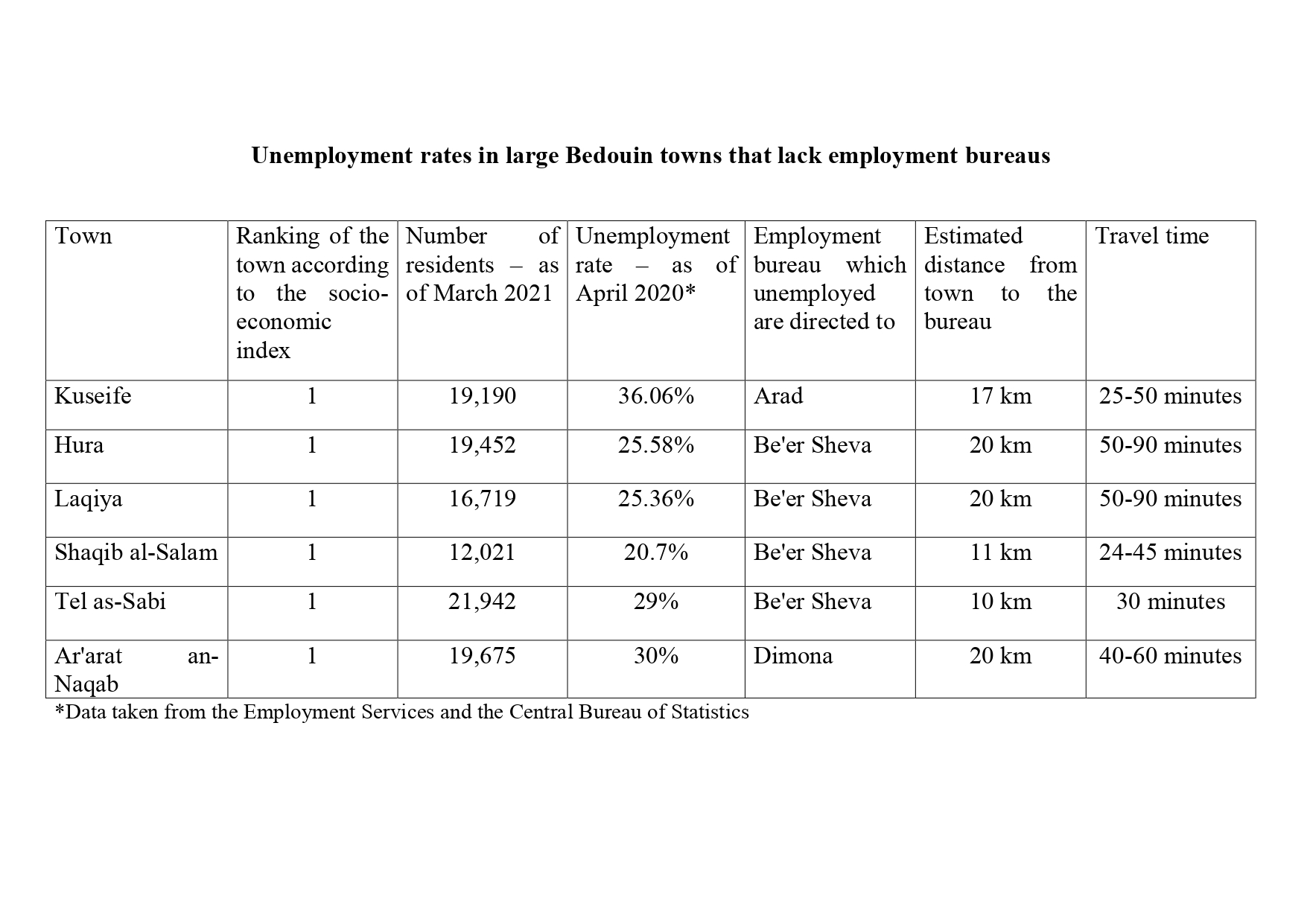Adalah, CSOs, and local councils petition Israeli Supreme Court demanding opening of employment bureaus in Naqab Bedouin towns
On 20 March 2022, Adalah – The Legal Center for Arab Minority Rights in Israel filed a petition to the Israeli Supreme Court demanding that the Minister of Economy and Industry establish employment bureaus in Palestinian Bedouin towns in the Naqab (Negev). The petition was filed on behalf of the local councils of four Bedouin villages: Hura, Laqiya and Tel as-Sabi (Tel Sheva) and Ar'ara A-Naqab, the Negev Coexistence Forum for Civil Equality and the Sidra Association. According to official government data, the four villages, along with Shaqib al-Salam and Kuseife which together have more than 100,000 residents, suffer from the highest unemployment rates in the country, ranging between 20 and 36% (see chart below). Rahat – the seventh government-planned town in the Naqab - is the only Bedouin town in the Naqab that has an employment bureau. In light of the Ministry of Economy and Industry’s continued refusal to disclose the criteria guiding it in its decision to establish employment bureaus, the petition also demands the adoption and disclosure of uniform, transparent, and applicable criteria for the establishment of new employment bureaus.
Despite extremely high unemployment rates, none of the six Bedouin villages has an employment bureau. Instead, residents of these villages are forced to travel to towns that enjoy higher socio-economic status and where the unemployment rates are significantly lower, to receive employment services. Travel time to reach employment bureaus that serve Bedouin residents can be up to an hour.
HCJ 1929/22 Local Council Tel as-Sabi, et. al. v. Minister of Economy and Industry
CLICK HERE to read the petition [Hebrew]
The petition, filed by Adalah Attorneys Nareman Shehadeh-Zoabi and Salam Irsheid, was submitted amid the slow return to employment of Bedouin residents who became unemployed during the COVID-19 pandemic. The Israeli Employment Service issued a report in June 2021, which noted that:
“The Bedouin population in the south entered the COVID19 crisis when it already suffered from high structural and chronic unemployment rates … approximately 30% of Bedouin job seekers in the south have been in chronic and prolonged unemployment for more than two years - dramatically higher than any other group.”
The petitioners argued that in addition to the considerable distance of employment bureaus from the Bedouin towns and the aggravation of this inaccessibility by inadequate public transportation services, existing employment bureaus are linguistically and culturally inaccessible to the Bedouin population. The petitioners further argued that an examination of existing employment bureau locations indicates discriminatory practices in the implementation of the law requiring the Ministry of Economy to establish employment bureaus. For instance, while the Israeli Jewish city of Dimona in the Naqab is only 19 kilometers (about half an hours’ drive) from the Israeli-Jewish town Yeruham, both have employment bureaus. In stark contrast, Ar'ara, with an almost identical population to Yeruham (approximately 19,500 residents), lacks an employment bureau, despite being farther from Dimona than Yeruham and consistently suffering far higher unemployment rates.
In addition to the 100,000 residents in larger Bedouin localities, the lack of employment bureaus in them also affects the 130,000 residents of neighboring Bedouin villages, recognized and unrecognized alike. The unemployment rates are even more severe in those villages, for instance, as of April 2020, the unemployment rate in the Al-Qassum Regional Council, which serves seven villages and many unrecognized villages, is approximately 53%.
 In light of the blatant discrimination in the establishment of employment bureaus as demonstrated in official data (see table above), the petitioners demand that employment bureaus be opened in the Bedouin localities and that the Ministry of Economy and Industry and the Israeli Employment Service adopt, disclose and operate with uniform and transparent criteria in examining the establishment of employment bureaus.
In light of the blatant discrimination in the establishment of employment bureaus as demonstrated in official data (see table above), the petitioners demand that employment bureaus be opened in the Bedouin localities and that the Ministry of Economy and Industry and the Israeli Employment Service adopt, disclose and operate with uniform and transparent criteria in examining the establishment of employment bureaus.
Adalah Attorneys Nareman Shehadeh-Zoabi and Salam Irsheid added:
“There is no clearer illustration of institutional racism than the fact that the population suffering from the highest poverty and unemployment rates in the country has little access to employment services. The Minister’s refusal to disclose the criteria by which she operates is no less severe than the discrimination itself since the lack of equitable criteria will very likely lead to arbitrary and prejudicial decisions. It must be ensured that the principles guiding the Employment Service are relevant and serve the purpose of reducing unemployment rates among all citizens of Israel equally.”
Haia Noach, Executive Director of the Negev Coexistence Forum for Civil Equality, added:
"The shortage of employment bureaus is blatant discrimination in relation to the other towns in the Naqab. Only in the Bedouin towns in the Naqab are there no employment bureaus, despite those towns suffering from the highest unemployment rate in the Naqab. It is a pity that we must petition to the Supreme Court to ensure access to employment services, an issue the government placed on the agenda in its five-year plan for Bedouin citizens. The government’s left hand doesn't know what the right hand is doing.”
Relevant Press Releases:
Adalah and the Negev Coexistence Forum demand the opening of employment bureaus in Naqab Bedouin towns 30 July 2021.













